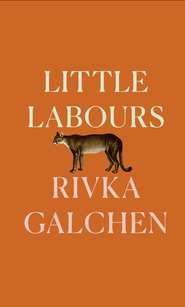По всем вопросам обращайтесь на: info@litportal.ru
(©) 2003-2024.
✖
American Innovations
Автор
Год написания книги
2019
Настройки чтения
Размер шрифта
Высота строк
Поля
Early Saturday morning I found myself knocking on Jacob’s half-open door; this was when my world began to grow strange to me—strange and yet also familiar, as if my destiny had once been known to me and I had forgotten it incompletely. Jacob’s voice invited me in.
I’d never been to his apartment before. It was tiny, and smelled of orange rinds, and had, incongruously, behind a futon, a chalkboard; also so many piles of papers and books that the apartment seemed more like the movie set for an intellectual’s rooms than like the real McCoy. I had once visited a ninety-one-year-old great-uncle who was still conducting research on fruit flies, and his apartment was cluttered with countless hand-stoppered jars of cloned fruit flies and also hot plates for preparing some sort of agar; that apartment was what Jacob’s brought to mind. I found myself doubting that Jacob truly had a wife and child, as he had so often claimed.
“Thank God you’ve come,” Jacob said, emerging from what appeared to be a galley kitchen but may have been simply a closet. “I knew you’d be reliable, that at least.” And then, as if reading my mind: “Natasha sleeps in the loft we built. My wife and I sleep on the futon. Although yes, it’s not much for entertaining. But can I get you something? I have this tea that one of my students gave me, exceptional stuff from Japan, harvested at high altitude—”
“Tea, great, yes,” I said. To my surprise, I was relieved that Jacob’s ego seemed to weather his miserable surroundings just fine. Also to my surprise I felt tenderly toward him. And toward the scent of old citrus.
On the main table I noticed what looked like the ragtag remains of some Physics 101 lab experiments: rusted silver balls on different inclines, distressed balloons, a stained funnel, a markered flask, a calcium-speckled Bunsen burner, iron filings and sandpaper, large magnets, and yellow batteries likely bought from a Chinese immigrant on the subway. Did I have the vague feeling that “a strange traveler” might show up and tell “extravagant stories” over a meal of fresh rabbit? I did. I also considered that Jacob’s asking me to murder him had just been an old-fashioned suicidal plea for help.
“Here, here.” Jacob brought me tea in a cracked porcelain cup.
I thought, somewhat fondly, of Ilan’s old inscrutable poisoning jokes. “Thanks so much,” I said. I moved away from that table of hodgepodge and sat on Jacob’s futon.
“Well,” Jacob said gently, also sitting down.
“Yes, well.”
“Well, well.”
“Yes,” I said.
“I’m not going to hit on you,” Jacob said.
“Of course not. You’re not going to kiss my hand.”
“No.”
The tea tasted like damp cotton.
Jacob rose and walked over to the table, spoke to me from across the compressed distance. “I presume that you learned what you could. From those scribblings of Ilan. Yes?”
I conceded. Both that I had learned something and that I had not learned everything. That much was still a mystery to me.
“But you understand, at least, that in situations approaching grandfather paradoxes very strange things can become the norm. Just as if someone running begins to approach the speed of light, he grows unfathomably heavy.” He paused. “Didn’t you find it odd that you found yourself lounging so much with me and Ilan? Didn’t it seem to beg explanation, how happy the three of us—”
“It wasn’t strange,” I insisted. I was right almost by definition. It wasn’t strange because it had already happened and so it was conceivable. Or maybe that was wrong. “I think he loved us both,” I said, confused for no reason. “And we both loved him.”
Jacob sighed. “Yes, OK. I hope you’ll appreciate the elaborate calculations I’ve done in order to set up these demonstrations of extraordinarily unlikely events. Come over here. Please. You’ll see that we’re in a region of, well, not exactly a region of unlikeness, that would be a cheap association—very Ilan-like, though, a fitting tribute—but we’ll enter a region where things seem not to behave as themselves. In other words, a zone where events, teetering toward interfering”—I briefly felt that I was a child again, falling asleep on our scratchy blue sofa while my coughing father watched reruns of Twilight Zone—“with a fixed future, are pressured into revealing their hidden essences.”
I felt years or miles away.
Then this happened, which is not the crux of the story, or even the center of what was strange to me: Jacob tapped one of the silver balls and it rolled up the inclined plane; he set a flask of water on the Bunsen burner and marked the rising level of the fluid; a balloon distended unevenly; a magnet under sandpaper moved iron filings so as to spell the word “egregious.”
Jacob turned to me, raised his eyebrows. “Astonishing, no?”
I felt like I’d seen him wearing a dress or going to the bathroom. What he had shown me were children’s magic tricks.
“I remember those science magic shows from childhood,” I said gently. I wasn’t not afraid. “I always loved those spooky caves they advertised on highway billboards.” Cousin or no cousin, Ilan had clearly run away from Jacob, not from me.
“I can see you’re resistant,” Jacob said. “Which I understand, and even respect. Maybe I scared you, with that killing me talk, which you weren’t ready for. We’ll return to it. I’ll order us in some food. We’ll eat, we’ll drink, we’ll talk, and I’ll let you absorb the news slowly. You’re an engineer, for God’s sake. You’ll put the pieces together. Sometimes sleep helps, sometimes spearmint—just little ways of sharpening a mind’s ability to synthesize. You take your time.”
•
Jacob transferred greasy Chinese food into marginally clean bowls, “for a more homey feel.” There at the table, that shabby impromptu lab, I found myself eating slowly. Jacob seemed to need something from me, something more, even, than just a modicum of belief. He had paid for the takeout. Halfway through a bowl of wide beef-flavored noodles—we had actually been comfortable in the quiet, at ease—Jacob said, “Didn’t you find Ilan’s ideas uncannily fashionable? Always a nose ahead? Even how he started wearing pink before everyone else?”
“He was fashionable in all sorts of ways,” I agreed, surprised by my appetite for the slippery and unpleasant food. “Not that it ever got him very far, always running after the next new thing. Sometimes I’d copy what he said, and it would sound dumb coming out of my mouth, so maybe it was dumb in the first place. Just said with charm.” Never before had I spoken aloud anything unkind about Ilan.
“You don’t understand,” Jacob said. “I guess I should tell you that Ilan is my as yet unborn son, who visited me—us—from the future.” He took a metal ball between two greasy fingers, dropped it twice, and then once again demonstrated it rolling up the inclined plane. “The two of us, Ilan and I, we collaborate.” Jacob explained that part of what Ilan had established in his travels, which were repeated and varied, was that contrary to popular movies, travel into the past didn’t alter the future, or, rather, that the future was already altered, or, rather, that it was all far more complicated than that. “I, too, was reluctant to believe,” Jacob insisted. “Extremely reluctant. And he’s my son. A pain in the ass, but also my beloved child.” Jacob ate a dumpling in one bite. “A bit too much of a moralist, though. Not a good business partner, in that sense.”
I no longer felt intimidated by Jacob. How could I? He had looped the loop. “If Ilan was from the future, that means he could tell you about your future,” I said.
“Sure, yes. A little.” Jacob blushed like a schoolgirl. “It’s not important. But certain things he did know. Yes. Being my son and all.”
“Ah, so.” I, too, ate a dumpling whole. Which isn’t the kind of thing I normally do. “What about my future? Did he know anything about my future?”
Jacob shook his head. I couldn’t tell if he was answering my question or just disapproving of it. “Right now we have my career to save,” he said. I saw that he was sweating, even along his exposed collarbone. “Can I tell you what I’m thinking? What I’m thinking is that we perform the impossibility of my dying before fathering Ilan. A little stunt show of sorts, but for real. With real guns and rope and poison and maybe some blindfolded throwing of knives. Real life. And this can drum up a bit of publicity for my work.” I felt myself getting sleepy during this speech of his, getting sleepy and thinking of circuses and of childhood trips to Las Vegas and of Ilan’s mattress and of the time a small binder clip landed on my head when I was walking outside. “I mean, it’s a bit lowbrow, but lowbrow is the new highbrow, of course, or maybe the old highbrow. It’ll be fantastic. Maybe we can go on Letterman.
Вы ознакомились с фрагментом книги.
Приобретайте полный текст книги у нашего партнера:
Приобретайте полный текст книги у нашего партнера:









